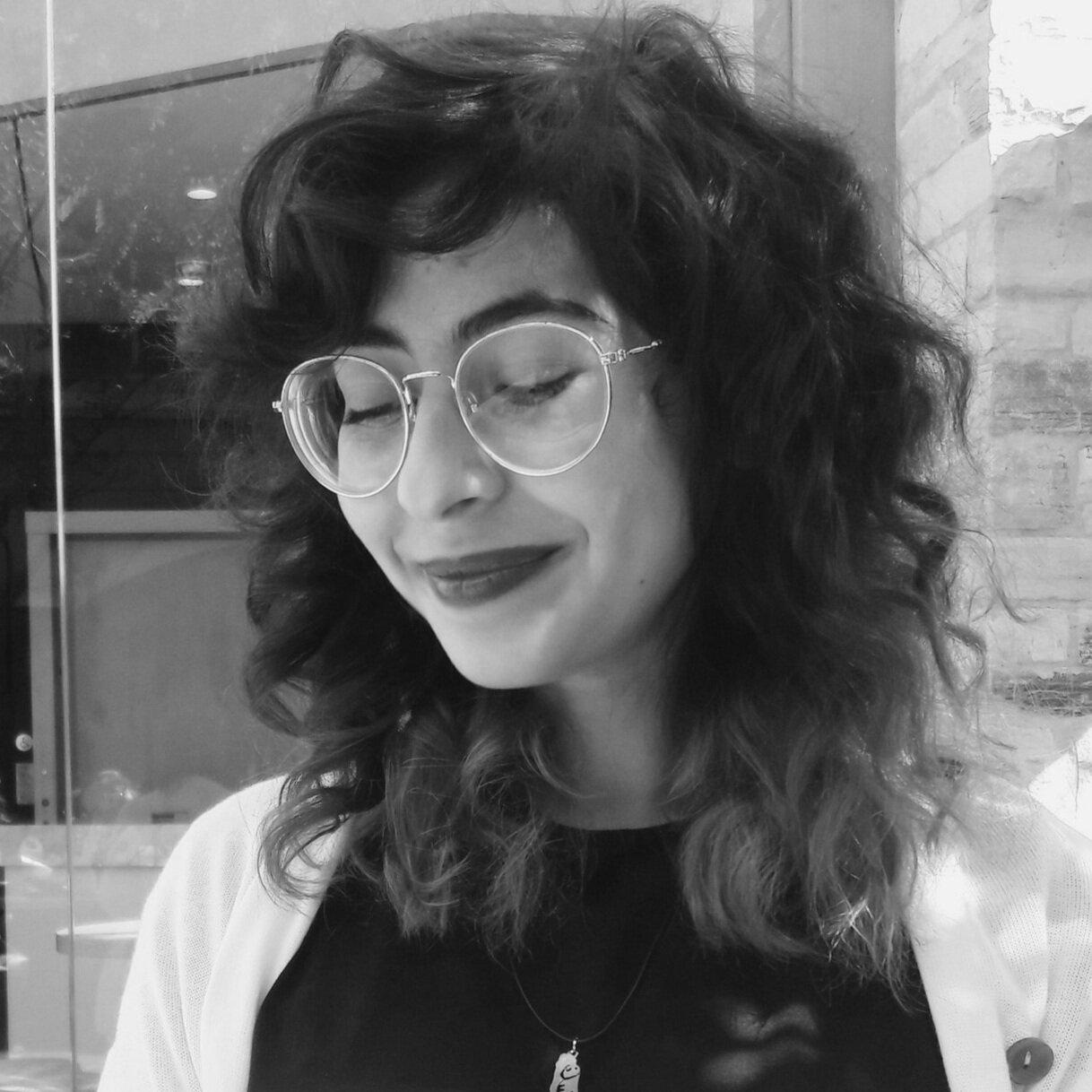Constellations Series: The Camera Doesn't Love Anyone
Constellations is a series of responses to Mosaic’s virtual production of Dalia Taha’s KEFFIYEH/MADE IN CHINA, curated by Fargo Tbakhi. We invited Palestinian artists, writers, and thinkers to contribute pieces which are in conversation with Taha’s play. Some pieces will directly respond to the episodes; some will merely take them as a point of departure. All of them will be thoughtful and beautiful articulations of Palestinian artmaking, thought, and expression. Our hope is that this series can expand on and strengthen Mosaic’s commitment to Palestinian culture-workers, creating a constellation of artistic expression which mirrors and honors the loose, non-linear structure of KEFFIYEH/MADE IN CHINA.
Today, Radius of Arab American Writers board member Summer Farah responds to our third episode, “The Camera Doesn’t Love Anyone.” She writes about translation, the mediated performances of Muna El Kurd, and how Palestinian women subvert and escape the performances of legibility required of them.
Ahlan wa sahlan—welcome. Thank you for being here.
THE CAMERA DOESN’T LOVE ANYONE negotiates a familiar, anxious visibility. The scene features two women constructing a story: their sentences overlap with contradictions and corrections, pulling from an impossibly vague specificity; they are performing, both for an audience and for a man preparing to record them. They are being surveilled twofold, and as such, there is so much at stake in the performance of language. Much of the scene negotiates respectability; with Palestinians, this negotiation can be so severe that even our name is obscured. In different contexts, there are other concessions to be made—although the truth is if we are not speaking fully then we are not being understood, and if we are compromising any part of our freedom we are compromising it fully. To narrate uninterrupted, then, is a movement towards liberation.
I have taken in so much history via quote Tweets from bilingual friends quickly translating footage or graffiti: much of my understanding and awareness of Home is via translation, the literal Arabic to English or the more abstract body to screen. THE CAMERA DOESN’T LOVE ANYONE recognizes this tension:
w2: there is a translation
w1: there is always a translation
w2: so that everybody understands
w1: so that everybody hears
w2: so that everybody sees
w1: so that everybody pays attention
Like all things, the act of translation is not neutral; I see it first and foremost as a tool of accessibility—who are we making ourselves accessible to? What are the different forms of translation we undertake in order to make ourselves legible?
In translation, there can be erasure; I am reminded of Jessica Abughattas’s “Semantics,” particularly the version published in Tinderbox in 2018. The poem is a form of translation, dancing through the different identities Palestinians morph among in a US context. In this shapeshifting, there is erasure: these erasures are both top-down, brought on by our colonizers: “when we made Moroccan couscous, / we called it Israeli”; and self-inflicted, for safety: “when we were asked at the airport, / we were Lebanese.”
When we must suppress ourselves in the name of safety, what happens in those moments of sacrifice? What parts of us survive when we end the negotiations?
The endings forgoing translation, forgoing negotiation; a self rebuilds through a series of affirmations:
“Say it for the people in the back row: Palestine.
Say it for the people in the front row: Palestine.
Say it and say it again and again, the letters
becoming softer in your mouth.
falasteen, ya blade”
It is in art like this that I see the destruction inflicted by these negotiations repaired.
In community there is healing. In art there is healing, and in resistance, too. As Palestinians on the ground in Sheikh Jarrah inspire an unprecedented amount of international solidarity with their fight for liberation, I have never felt more assured when I speak up for us; I am not afraid nor do I hedge my language. We are right and we deserve freedom. Simultaneously, the silences of others resonate even heavier. I have had endless conversations with loved ones about these silences—we ask each other, what are they afraid of?
In a way, we know already—Palestinians are systemically silenced for speaking out. As I write this, I alternate between my notes and photos of the El-Kurd twins embracing their father after being released from Israeli detention. In the US, Palestinians have been fired for demanding recognition of their humanity while Canary Mission continues to lurk and threaten student activists. I wonder, though, to what extent do the silent know of these injustices?
w2: when they see
w1: they will know
w2: they will love her
w1: and they will want to hear
w2: and see
w1: even more
w2: because she has to talk
w1: everybody wants to talk
w2: but nobody wants to listen
As an anxious reader, this scene resembles someone fighting with themself in order to perform the “right” expression—instead, the two voices converse through an understanding of the language of respectability. The women recognize a form of being “heard” and all of the contradictions that arrive therein. Respectability can be a translation, too, and its navigation a dehumanizing one; what really occurs is the tip-toeing around your personhood in order to appear unthreatening. Perhaps we should be. The problem with adhering to respectability is that Facebook does not care about tone—the simple utterance of Palestine is shadow banned. The foul Stop Antisemitism Twitter-verified account is a well-funded harrasser of vocal Palestinians and anti-Zionists, framing their liberatory language as hate speech; a Zionist will not hear a Palestinian discuss the dispossession of their land at any volume, any frequency. If we are going to be interpreted by our colonizers, why should we mince our words? Or, why can we not find new languages that speak just as boldly? From this censorship, new legibilities grow; if Facebook’s algorithm reads فلسطين and goes red alert, then to inform the masses of the violence occurring they will write ڡلسطىں. The conversation becomes—if you know, you know. If you do not, you must strive to listen; our silencing signals something necessary to be heard, as is our effort, too.
THE CAMERA DOESN’T LOVE ANYONE beings with a clear image:
WOMAN 1 (W1): Her voice is clear
WOMAN 2 (W2): and she talks, she stops and she remains silent
w1: and then she continues
w2: without trembling
w1: without crying
w2: without being sad
w1: without smiling
The woman is stifled and contradictory, her expression manipulated until there is no defining trait. Maybe not fully human. This is not how Palestinians actually are: there is passion, there is fear, there are soft voices, there are expletives, there are children who are interviewed immediately after the bomb falls on their home, and they are crying, and some of us are listening.
Towards the end of April, a video circulated online of an American settler in Sheikh Jarrah being told by Muna el-Kurd, her back turned to the camera:
“Yakob, you know this is not your house…you! are! stealing! my! house!”; she draws out that last phrase, an emphasis on each word. This performance may be for him, to drive home the point that he is doing something despicable (he knows!). But it is for those of us watching as well. In this video, with Muna stretched over with incredulity at the violence being done to her and her family, I am the audience. In THE CAMERA DOESN’T LOVE ANYONE, the women presume that an audience demands a performance which strips humanity, complexity from the Palestinian. This audience is true, and to me, a general default, especially when someone else is holding the camera. But Muna instead holds her own, and thus creates a new audience.
Muna and I are basically the same age. At times, our Instagram accounts look identical: snapshots of good outfits, making breakfast, spending time with friends. Curated, chic, cool. Other times, our accounts are vastly different: a protest to save her neighborhood, the release of her and her brother from prison, a settler trying to steal her home. THE CAMERA DOESN’T LOVE ANYONE considers not just an audience, but two forms of surveillance: the audience and the documentarian. When Muna becomes the documentarian, the narrative takes on her voice—and that voice is informed by her Instagram, by her aliveness, by her 20-something-womanhood. I am so drawn to the moments where she takes group photos—a selfie, her face in close-up view while a crowd of people scrunch in behind her. She is always smiling. In one, she throws up a peace sign. These images are so ordinary, so familiar, because of course: she is just a person. But personhood is something denied to her as a resident of East Jerusalem and as a Palestinian writ large. Through this narrative control, she can be so much more than what our colonizers’ historians allow us to be. The camera loves her, as it should.
Additional Threads
At the end of each Constellations entry, we’ll ask the responding artist to share Palestinian organizations, artists, or pieces they think we should know. Here are Summer’s picks.
Palestine Hosting Society, a project to preserve and regain the food history threatened by settler-colonialism.
Tatreez & Tea archive of motifs from across Palestine and history of the art
Unity Intifada, the document circulating across Palestine and globally
A Bird Is Not a Stone: Anthology of Contemporary Palestinian Poetry; project by Palestinians and Scottish comrades to translate work into English, Scots, Gaelic and Shetlandic, alongside the original Arabic
The Book of Disappearance by Ibtisam Azem, brilliant work translated from Arabic by Sinan Antoon that illustrates different types of narrative control
Strip by Jessica Abughattas, the (incredible) full-lenth of the poet whose work I cite; check out a revision of "Semantics" in here!
N.A. Mansour, a historian and cultural critic working on intellectual & visual history and editor at Hazine
Networked Refugees by Nadya Hajj, forthcoming this fall in digital open-access is an in-depth study of the ways Palestinians across the diaspora use technology to connect and recreate community structures disrupted by settler-colonialism
Summer Farah is a Palestinian American poet and editor. She is the outreach coordinator for the Radius of Arab American writers. Summer is currently a reviewer at Vagabond City Lit and co-writes the biweekly newsletter Letters to Summer. Her work has been published in or is forthcoming from Mizna, LitHub, The Rumpus, and other places. Connect with her on Twitter @summabis.

